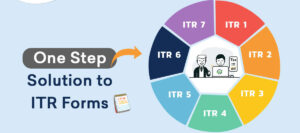![]()
 ITR Applicable Form
ITR Applicable Form
However, if the service provider operates as a business entity, the appropriate form may vary:
1. Sole Proprietorship:
If you operate as a sole proprietor providing contractual services, you would typically report your business income and expenses on Schedule C (Profit or Loss From Business) or Schedule C-EZ if you meet specific criteria. The results from these schedules are then transferred to Form 1040.
2. Single-Member LLC:
If you have a Limited Liability Company (LLC) with only one member and you choose not to be taxed as a corporation, you would generally follow the same process as a sole proprietor and report your income and expenses on Schedule C or C-EZ.
3. Partnership:
If you’re part of a partnership that provides contractual services, the partnership itself does not pay taxes. Instead, the partnership files Form 1065 (U.S. Return of Partnership Income), and each partner receives a Schedule K-1 (Partner’s Share of Income, Deductions, Credits, etc.), which they use to report their share of the partnership’s income on their individual tax return.
4. Corporation:
If you’ve structured your contractual service business as a corporation (C Corporation), the corporation files its own corporate tax return using Form 1120 (U.S. Corporation Income Tax Return).
The corporation’s income is taxed at the corporate level, and any dividends or distributions to shareholders are taxed at the individual level.
6. S Corporation:
If your contractual service business operates as an S Corporation, the corporation itself does not pay taxes on its income. Instead, the income, deductions, and credits flow through to the shareholders’ individual tax returns via Form 1120S (U.S. Income Tax Return for an S Corporation) and Schedule K-1.
It’s important to consult with a tax professional or accountant to determine the specific tax form and requirements that apply to your contractual service provider situation.
The appropriate form can vary based on factors such as your business structure, income level, and eligible deductions. Additionally, tax regulations can change, so it’s always advisable to stay updated on the latest tax guidelines and requirements.
FAQs:
To visit: https://www.incometax.gov.in
For further details access our website: https://vibrantfinserv.com